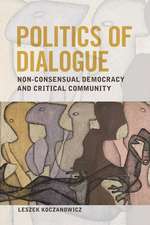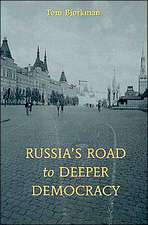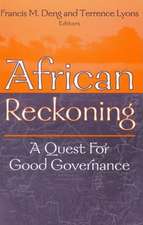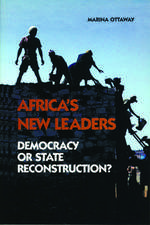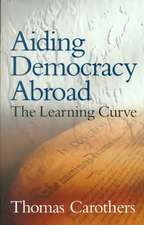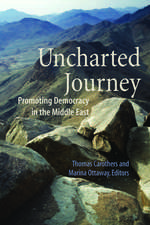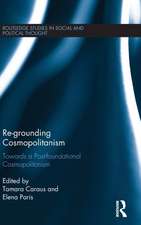Development Aid Confronts Politics: The Almost Revolution
Autor Thomas Carothers, Diane de Gramonten Limba Engleză Paperback – 11 apr 2013
A new lens on development is changing the world of international aid. The overdue recognition that development in all sectors is an inherently political process is driving aid providers to try to learn how to think and act politically.
Major donors are pursuing explicitly political goals alongside their traditional socioeconomic aims and introducing more politically informed methods throughout their work. Yet these changes face an array of external and internal obstacles, from heightened sensitivity on the part of many aid-receiving governments about foreign political interventionism to inflexible aid delivery mechanisms and entrenched technocratic preferences within many aid organizations.
This pathbreaking book assesses the progress and pitfalls of the attempted politics revolution in development aid and charts a constructive way forward.
Contents:
Introduction
1. The New Politics Agenda
The Original Framework: 1960s-1980s
2. Apolitical Roots
Breaking the Political Taboo: 1990s-2000s
3. The Door Opens to Politics
4. Advancing Political Goals
5. Toward Politically Informed Methods
The Way Forward
6. Politically Smart Development Aid
7. The Unresolved Debate on Political Goals
8. The Integration Frontier
Conclusion
9. The Long Road to Politics
Major donors are pursuing explicitly political goals alongside their traditional socioeconomic aims and introducing more politically informed methods throughout their work. Yet these changes face an array of external and internal obstacles, from heightened sensitivity on the part of many aid-receiving governments about foreign political interventionism to inflexible aid delivery mechanisms and entrenched technocratic preferences within many aid organizations.
This pathbreaking book assesses the progress and pitfalls of the attempted politics revolution in development aid and charts a constructive way forward.
Contents:
Introduction
1. The New Politics Agenda
The Original Framework: 1960s-1980s
2. Apolitical Roots
Breaking the Political Taboo: 1990s-2000s
3. The Door Opens to Politics
4. Advancing Political Goals
5. Toward Politically Informed Methods
The Way Forward
6. Politically Smart Development Aid
7. The Unresolved Debate on Political Goals
8. The Integration Frontier
Conclusion
9. The Long Road to Politics
Preț: 163.91 lei
Nou
Puncte Express: 246
Preț estimativ în valută:
31.36€ • 32.83$ • 25.95£
31.36€ • 32.83$ • 25.95£
Carte tipărită la comandă
Livrare economică 07-21 aprilie
Preluare comenzi: 021 569.72.76
Specificații
ISBN-13: 9780870034008
ISBN-10: 0870034006
Pagini: 360
Dimensiuni: 152 x 229 x 23 mm
Greutate: 0.57 kg
Editura: Brookings Institution Press
Colecția Carnegie Endowment for Int'l Peace
ISBN-10: 0870034006
Pagini: 360
Dimensiuni: 152 x 229 x 23 mm
Greutate: 0.57 kg
Editura: Brookings Institution Press
Colecția Carnegie Endowment for Int'l Peace
Notă biografică
Thomas Carothers is vice president for studies at the Carnegie Endowment for International Peace and director of Carnegie's Democracy and Rule of Law Program. A leading authority on international support for democracy and governance, he is the author of numerous critically acclaimed books and articles on the topic. Diane de Gramont, a Clarendon Scholar at Oxford University, was previously a researcher in the Democracy and Rule of Law Program at the Carnegie Endowment for International Peace.
Descriere
A new lens on development is changing the world of international aid. The overdue recognition that development in all sectors is an inherently political process is driving aid providers to try to learn how to think and act politically.
Major donors are pursuing explicitly political goals alongside their traditional socioeconomic aims and introducing more politically informed methods throughout their work. Yet these changes face an array of external and internal obstacles, from heightened sensitivity on the part of many aid-receiving governments about foreign political interventionism to inflexible aid delivery mechanisms and entrenched technocratic preferences within many aid organizations.
This pathbreaking book assesses the progress and pitfalls of the attempted politics revolution in development aid and charts a constructive way forward.
Contents:
Introduction
1. The New Politics Agenda
The Original Framework: 1960s-1980s
2. Apolitical Roots
Breaking the Political Taboo: 1990s-2000s
3. The Door Opens to Politics
4. Advancing Political Goals
5. Toward Politically Informed Methods
The Way Forward
6. Politically Smart Development Aid
7. The Unresolved Debate on Political Goals
8. The Integration Frontier
Conclusion
9. The Long Road to Politics
Major donors are pursuing explicitly political goals alongside their traditional socioeconomic aims and introducing more politically informed methods throughout their work. Yet these changes face an array of external and internal obstacles, from heightened sensitivity on the part of many aid-receiving governments about foreign political interventionism to inflexible aid delivery mechanisms and entrenched technocratic preferences within many aid organizations.
This pathbreaking book assesses the progress and pitfalls of the attempted politics revolution in development aid and charts a constructive way forward.
Contents:
Introduction
1. The New Politics Agenda
The Original Framework: 1960s-1980s
2. Apolitical Roots
Breaking the Political Taboo: 1990s-2000s
3. The Door Opens to Politics
4. Advancing Political Goals
5. Toward Politically Informed Methods
The Way Forward
6. Politically Smart Development Aid
7. The Unresolved Debate on Political Goals
8. The Integration Frontier
Conclusion
9. The Long Road to Politics



